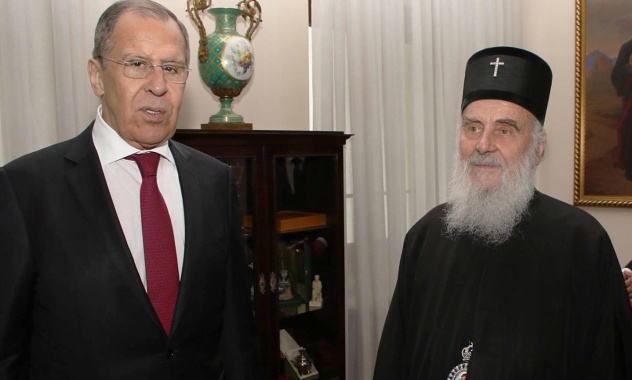Head of Russian Ministry of Foreign Affairs meets with Primate of Serbian Orthodox Church
On 18 June 2020, the Minister of Foreign Affairs of the Russian Federation Sergey V. Lavrov met with His Holiness Patriarch Irenaeus of Serbia.
Among the participants in the meeting were Vicar Bishop Stefan of Remesiana, General Secretary (head of the presidential administration) Nikola Selakovic, and personal secretary to the Patriarch Dejan Nakic.
In the beginning of the talk, the head of the Russian foreign affairs department stressed addressing the Primate of the Serbian Church, ‘We always seek to support the clergy of Orthodox Churches in their efforts to make their own contribution to peace in various regions of the world, including the Balkans’.
Among the topics touched upon during the talk were the situation in Kosovo and Metohija and the status of the canonical Church in Montenegro. As is known, in late last October, the Montenegro parliament adopted a law ‘On Freedom of Faith and Beliefs and Legal Status of Religious Communities’ that provoked mass protests as it substantially infringes upon the rights of the faithful of the Serbian Orthodox Church and creates prerequisites for the requisition of historic churches and monasteries from the communities. The Supreme Authority of the Russian Church stated its position on this bill in the Patriarchal and Synodal Message ‘On the Situation in Montenegro’, adopted by the Holy Synod on 30 December 2019.
His Holiness Patriarch Irenaeus made a special mention of the preparations for celebrations to be held on the occasion of the Grand Consecration of the St. Sava Cathedral at Vracar in Belgrade. A great contribution to the adornment of its interior by unique mosaics was made by the Russian state with the participation of the Russian Orthodox Church. During the meeting, it was noted in particular that about 85% of the mosaics was already in place and it is planned to complete this work in two months’ time.
After the meeting, His Holiness Patriarch Irenaeus of Serbia and Sergey V. Lavrov communicated with journalists.
As Mr. Lavrov noted, in the Balkans today, just as in other regions of the world, the situation is uneasy and there is a great deal of risks of its further aggravation. ‘The echoes of these crises resound ever more loudly in the European continent’, he stated, ‘In the course of these conflicts, quite radical attitudes appear, including extremist attacks against Christians, especially Orthodox. The situation is aggravated by quite an aggressive promotion of neoliberal values by our western partners who seek to impose that on all the rest’.
According to Mr. Lavrov, in this situation, every responsible state should stand up for its history, culture, traditions which have been bequeathed by its ancestors. ‘Russia, together with Serbia and quite a number of other like-mined peoples, is pursuing this policy’, he said, ‘In this situation, we are acting in one direction with Orthodox Churches, including the Russian Orthodox Church, the Serbian Orthodox Church, which have traditionally defended not only age-old values of their own, but have always acted as peacemakers’.
The Russian minister mentioned that this position is not liked by all; it is especially rejected by those who seek to establish their own ‘unique’ orders for the whole globe. ‘That is why the Orthodox Churches in all countries in which they are located are subjected to severe attacks’, Mr. Lavrov said, ‘These attacks should be opposed by the power of spirit that has always distinguished Orthodox people’.
He noted that ‘Russia will always defend the interests of Orthodox Churches, come out against attempts at state interference in their internal affairs, act hand by hand with Orthodox Churches and their hierarchs in promoting the ideals of peace-making for appeasing numerous conflicts in our common space’.
DECR Communication Service
With reference to the websites of MFA Russia
and the Serbian Orthodox Church


















